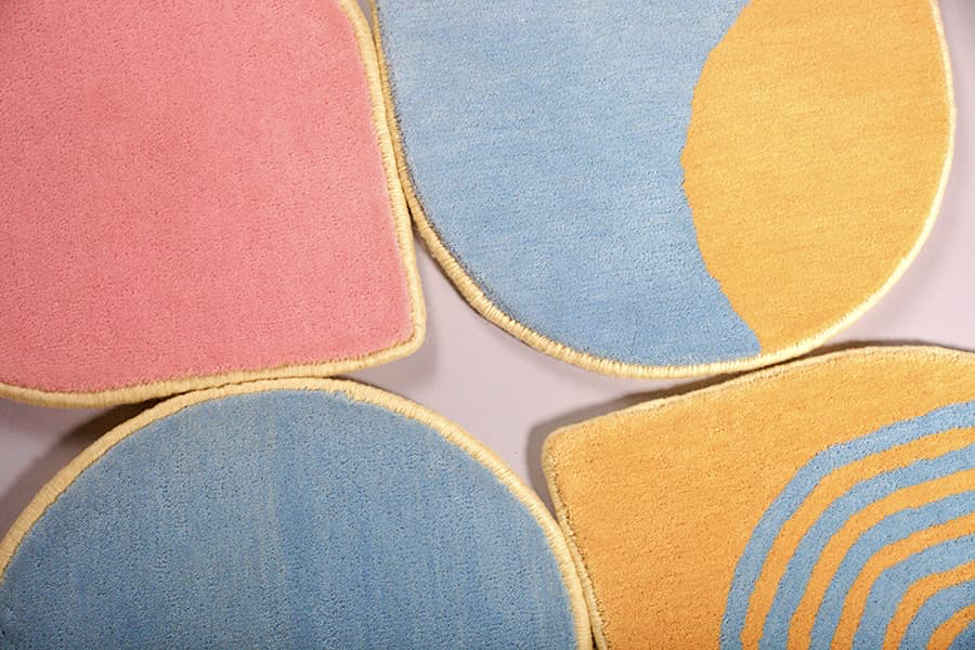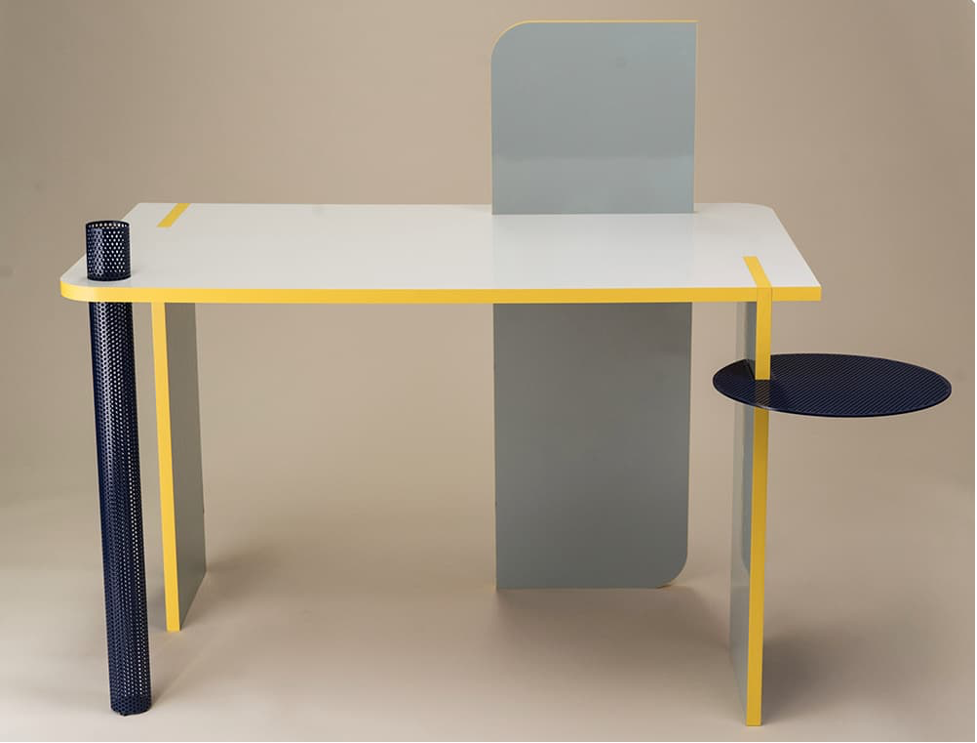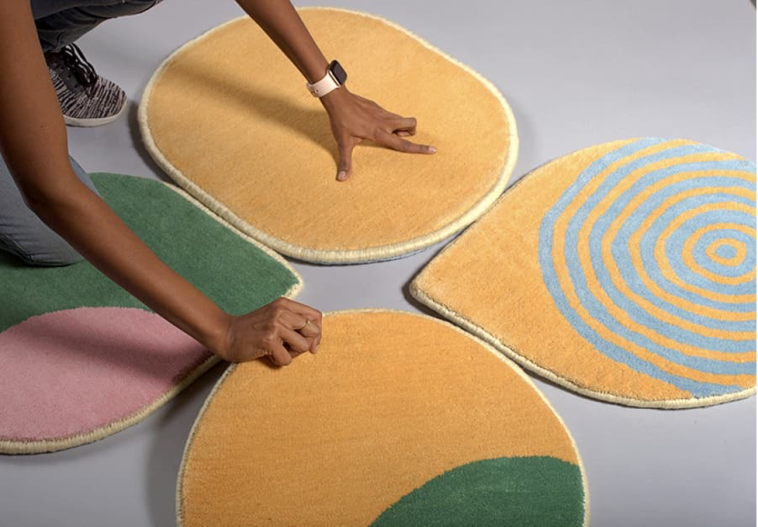Design today is more than just a matter of aesthetics; it’s a way we interact with the world around us. As technology advances and society’s needs change, designers are at the forefront, ensuring that products and spaces aren’t just beautiful, but also functional and user-friendly. In this fast-paced environment, the design industry continues to play a key role in shaping our experiences with the everyday items and spaces we encounter.
In this landscape, Jayati Sinha stands out as a remarkable multidisciplinary figure. Her background in lifestyle products, environment design and now digital products has equipped her with a very diverse skill set, blending the practical with the imaginative. From her early days working in Indian craft industries to her significant roles at Fuseproject and Accenture (previously Fjord), Jayati has demonstrated a consistent ability to infuse emotional depth and storytelling into her designs. Recognized for her contributions and awarded for her innovations, she has established herself as a force in the design world. Her work is not just about creating objects but about crafting experiences that resonate with people on a personal level.
As we delve into Jayati’s world, we highlight a critical aspect of her professional identity: adaptability. This trait has been instrumental in her ability to tackle a wide array of challenges and project requirements, setting her apart in the ever-evolving design landscape. Join us in exploring the mind and work of a designer who is continuously redefining our everyday interactions with the world.
From fortune-telling to tangible creations
Jayati Sinha’s journey into the world of design began in childhood, influenced by the enchanting world of Disney characters. “As a kid watching Disney tv shows, I had a profound interest in imaginative storytelling,” she shared. This early fascination laid the foundation for her unique approach to design, transforming it from a purely functional task into a rich, narrative-driven process.
Her design philosophy revolves around storytelling, where each product tells its own tale. “It taught me to weave narratives through products, considering the user’s journey and incorporating surprise elements for a more engaging design,” she added. For Jayati, the art of design is as much about the story behind the creation as it is about the functionality of the product itself. By infusing each design with a narrative, she creates empathetic connections that resonate deeply with users.
Jayati’s passion for storytelling in design is not just about the creation process but also how the products are presented and perceived. “The more you create these stories and show your work through them and see people be excited about it and smile and have fun, the more you realize the importance of it,” she said. Her approach highlights the significance of engaging with the audience, where the art lies not only in creating a product but in sparking excitement and joy through its story.
A closer look at projects Extrude and Odyssey
Jayati’s approach to design is deeply rooted in the concept of emotional resonance and memory. Speaking about her projects, she said, “I believe that as we go through life and have experiences, we often collect objects that remind us of those moments in our past.” Her designs, particularly the Memoir cabinet and the Odyssey collection, are more than just products; they are invitations to reflect on personal journeys and celebrate individual growth. These pieces, stemming from her extensive thesis work, are not just aesthetically pleasing but are imbued with deeper significance.

The Extrude table, showcased at ICFF, is a prime example of Jayati’s thoughtful approach to design. “It was a very well-thought-out product where I looked at how people actually behave in their day-to-day life, but it also has a lot of character,” she explained. In her world of design, every object should possess character, going beyond mere functionality to become a meaningful part of one’s life.

For Jayati, the essence of design lies in its ability to evoke emotions and memories. “A product often disappears as a form and becomes one with its function, but a piece with character discovers a new territory,” she added. Her designs challenge the conventional view of products as mere tools, instead emphasizing their role in creating environments and experiences that resonate with people. She believes in designing objects that leave a lasting impression, encouraging people to remember and cherish their journey. “Never forget how you got to where you are,” she concludes, emphasizing the importance of memories and experiences in shaping our lives and the objects we cherish.
Thinking beyond stereotypes
Understanding the essence of the users is at the core of Jayati’s design approach. “I typically begin by gaining a firsthand understanding of the intended users,” she explains, highlighting her preference for direct conversations over secondary data. This methodology is crucial, as it not only offers a clear view of the users’ challenges but also brings into focus the emotional aspects of their experiences.
Direct engagement with users is a transformative aspect of her design process. According to Jayati, this approach enriches the project, taking it beyond a mere brief or problem statement. It becomes a multidimensional endeavor, intricately connected with real people and their narratives. This depth of understanding is what sets her designs apart, making them not just solutions to problems but closeness responses to human stories.
The result of this process is powerful. It forges a result that interlaces with the lives and stories of its users, as she added, “It transforms the project involving real people, their stories, and the potential impact our work could have on their lives.” This holistic view of design underscores her commitment to creating products that resonate deeply with the users, acknowledging their stories and emotions as integral to the design.
Design evolution
The transition from working with Indian craft industries to collaborating with global teams has significantly shaped Jayati’s design ethos. Her time in the Indian craft sector instilled a deep appreciation for traditional craftsmanship and the importance of cultural nuances and heritage preservation. This foundation played a crucial role in her understanding of design’s cultural and historical context.
Transitioning to a global stage, particularly at Fuseproject and later at Accenture (previously Fjord), brought new dimensions to her approach. “Collaborating with individuals from various backgrounds, not just cultural but also interdisciplinary teams, exposed me to approaches and perspectives I hadn’t thought of before,” she reflects. This multicultural and interdisciplinary exposure pushed her toward greater innovation, blending different ideas and methods. Such an environment cultivates a unique creativity, where ideas are not just shared but interwoven to create something truly distinctive.
Jayati emphasizes the profound impact of this diversity on her approach to collaboration and innovation. “It taught me what true collaboration is and how incorporating diverse viewpoints can lead to more holistic and groundbreaking solutions,” she notes. This experience underlines the value of diversity in design, where different perspectives can converge to foster groundbreaking and inclusive solutions.
Balancing color and patterns with modern minimalism
Incorporating color and patterns into designs, while aligning with the trend of modern minimalism, requires a delicate balance. This is a challenge Jayati embraces in her work. She finds joy and creative fulfillment in infusing her designs with vibrant elements. “A lot of the client work I do does not allow playing too much, but I try to push for it and find opportunities to have fun with my work,” she expresses, indicating her effort to blend her personal design style with client requirements.
Jayati’s design philosophy is centered around storytelling and emotional resonance, which is often reflected in the use of colors and patterns. “I’ve been seeing a lot of fun design work being done around me, and that makes me really happy because that’s the kind of design I resonate towards,” she mentions. For her, design is not just about aesthetics but about telling a story and evoking emotions.
Understanding the balance between minimalism and expressive design is key. Jayati acknowledges, “I have no problem with minimalism. I think there’s a time and place for that and it really is a balance.” She emphasizes the importance of not overcrowding a design, maintaining a harmony between function, form, and fun. This approach ensures her designs are not just visually appealing but also meaningful and engaging.
The T-shaped designer
The concept of a T-shaped designer perfectly encapsulates Jayati’s role and approach in her current position at Accenture , following her time at Fuseproject. Her work in design consultancies like these highlights the need for flexibility and adaptability in various project environments. “Consultancies require people that can be flexible and bend in different ways depending on the work that we are doing,” she explains. This adaptability is a crucial aspect of her professional identity, enabling her to navigate diverse challenges and project requirements.
Jayati’s broad skill set, which includes a deep dive into specific areas combined with a wide range of general skills, makes her particularly effective in her role. She emphasizes the value of being versatile in a consultancy environment, where being able to respond to a variety of problems is key. “It makes you a little bit more valuable when you can be thrown into a problem and your broad skill set allows you to carve something beautiful out of it,” she adds. This ability to turn challenges into opportunities for creative solutions is a hallmark of her work as a T-shaped designer.
The intersection of crafts and technology
The integration of traditional crafts with modern technology offers a fascinating blend of aesthetics and functionality. Jayati views this fusion as an opportunity to create products that are not only visually appealing but also technologically advanced. She points out, “It allows for the creation of products that are aesthetically rich and functionally advanced.” This approach caters to consumers who value both the heritage embedded in traditional crafts and the convenience of modern technology.
“Integrating technology can breathe new life into traditional crafts, making them more relevant in contemporary contexts,” she observes. This synergy not only preserves cultural heritage but also adapts it to suit modern market demands. An example Jayati shares is the Samsung frame TV in her home, which combines the elegance of a crafted art piece with the functionality of a television, seamlessly blending into her living environment.
However, Jayati emphasizes the importance of maintaining a balance in this fusion. Neither the craft element nor the technological aspect should dominate the other. “Balance is always key. Both things should learn from each other as well as complement each other while making the overall product better,” she advises. This principle ensures that the final product honors the craft’s heritage while leveraging the benefits of modern technology, resulting in a harmonious and enhanced user experience.
Vision for the future
As the world of design continuously evolves, Jayati maintains a clear vision for her role in its future. She is deeply invested in the wellness, health, and mental well-being aspects of design. Her commitment to considering the human element in her creations remains steadfast. “My focus has always been on areas like wellness, health, and mental well-being, where I deeply consider the impact on people,” she states. This focus underscores her belief in the importance of sensitivity toward human-centric design, regardless of the technological advancements or trends that may emerge.
Jayati’s design philosophy is anchored in understanding and enhancing the human experience. She emphasizes the necessity of being human-centric in design, a principle she believes will continue to be crucial in the future. For her, the essence of design lies not just in creating aesthetically pleasing or functional products, but in considering their impact on people’s well-being and mental health.
Looking forward, and as we close this wondrous tale, Jayati sees her mission as unchanging in the face of rapid advancements and transformations in the design industry. Her dedication to creating products that positively impact wellness and mental health is constant. It is this unwavering focus on human-centered design that will continue to guide her work, ensuring that her contributions to the design world remain relevant, meaningful, and empathetically grounded, no matter what the future holds.




